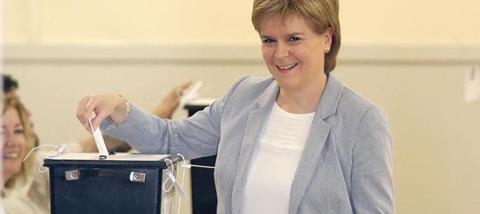
The people of Scotland have made it clear that they see their future in the European Union. Thus spake our First Minister, Nicola Sturgeon. And it seems that she has a point. After all did not all 32 of Scotland’s council areas vote to Remain?
Furthermore were not the Scottish people told during our own referendum in 2014 that if we wanted to remain part of the EU, then we would need to remain part of the UK. And now look at what has happened. As one SNP politician stated, ‘the people of Scotland have spoken with one voice’. And so now a second independence referendum will be called for. Simples...
Except it isn’t. There are other sides to consider. For a start the people of Scotland did not speak with one voice. 1.6 million out of a population of 5.5 million voted to Remain, but over 1 million voted to Leave. This despite every political party, and virtually every political leader, as well as virtually all the media, political classes and even the Church of Scotland, coming out in favour of Remain.
The notion was put around that it was only a few idiotic, racist, anti-immigrant UKIP types who would dare to go against the apparently universally accepted status quo, north of the border. Despite this, 38% voted to Leave, including many SNP supporters (myself included). This was because many could not understand why the SNP would want to be ‘an independent country in an interdependent Europe’ and then not apply the same logic to Scotland being an independent country in an interdependent UK. The one voice was the voice of the political and cultural establishment. The people of Scotland did not speak with one voice. The irony is that the one million Scots who voted to leave in effect provided the leave campaign with its majority.
The people of Scotland did not speak with one voice
There is also another wee difficulty. The people of Scotland already had a referendum. One in which they decided to remain a part of the United Kingdom. It was as part of that United Kingdom that we were asked to vote – not as a separate entity. The question on the ballot paper was not whether Scotland should remain part of the EU, but whether the UK (including Scotland) should. When the vote was looking really close, there was a great deal of speculation about what would happen if England narrowly voted to leave, and Scotland overwhelmingly voted to remain and as a result causing the whole UK to remain. There was much glee among some at this prospect. But now the boot is on the other foot and there is even more hand wringing and lamentation at the injustice of it all, from the very same people!
Will there be another Independence referendum for Scotland? Most doubt that, and opinion polls before the European referendum showed a strong majority for not having another Indy referendum, even if the UK voted to leave the EU and Scotland didn’t. There will be a lot of bluster, emotion and talk but unless things are hyped up into some kind of hysteria, I suspect it won’t go much further. But in this strange world in which we are living, who can say?
The fact is that for the Christian, although things may be strange, they are not out of control
The fact is that for the Christian, although things may be strange, they are not out of control, because we know the one who is sovereign. There are some key lessons for us to learn as believers:
- We need to be careful about identifying our politics with the kingdom of God. It is incredible how easily we can adapt both the facts of Scripture, and the circumstances, to suit any particular political feeling that we may have.
- Secondly we need to beware of presuming to speak for the people with one voice. There is only one voice, and it is not ours. Christians are to proclaim the Word of the Lord, not invest our own words with divine authority.
- We need to ensure that we do not seek our identity in nationality. I am amazed at how those who can decry some as ‘little Englanders’ because they are on the ‘wrong’ side on the EU referendum debate, are very happy to be nationalistic when it comes to the Scottish referendum, or indeed vice versa. I am glad that I am Scottish, and I love my country, but it is not my primary identity, which is in Christ. That doesn’t mean that I have to give up all nationality and join the One World Government for Peace and Harmony. It does mean that I avoid any kind of ethnic superiority, or racism, and instead realize that the nations are there as part of God’s gracious provision for the government of humanity, not the advancement of one particular chosen race.
There are indeed turbulent and troubled times. But they are also times of great opportunity, not least for the gospel. May it be that the nations of the United Kingdom, and the nations of Europe would know the renewing grace and power of the Gospel, as the Lord works in and through us.






























